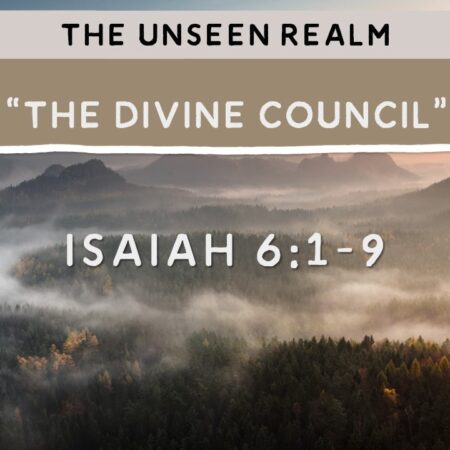Isaiah 6:1-9
Job 4:17-19
Job 15:14-15
Genesis 3:1-5
Colossians 2:1-15
Luke 10:18
Revelation 5:9-14
Dr. Michael Heiser “The Unseen Realm”
“First, God has a divine family – a heavenly assembly, or council, of ELOHIM. These ELOHIM are not a replacement of the Trinity, nor do they add to it. Yahweh is among the ELOHIM, but he is superior to all other ELOHIM. He is their creator and sovereign master. He is unique. Since Jesus is Yahweh in flesh, he too is distinct from, and superior to, all ELOHIM. While God has no need of a council, Scripture makes it clear that he uses one. His divine family is his divine administration. The ELOHIM serve him to carry out his decrees.
God also has a human family and administration. Their status and function mirror the divine family-administration. Just as with the members of the divine council who represent God in what they are tasked to do, so humans are God’s imaging representatives. Just as God doesn’t need a divine council, he doesn’t need humans, either – but he has chosen to use them to further his intentions for Earth.
Heaven and Earth are connected realms. God’s households operate in tandem toward a mutual destiny. Their points of intersection along the way inform many other threads of biblical theology.
With Eden the divine had come to earth, and earth would be brought into conformity. Humans were created to enjoy everlasting access to God’s presence, working side by side with God’s loyal ELOHIM. But this yearning of God’s came with risk, a risk that was fully known by him and accepted. Free will in the hearts and hands of imperfect beings, whether human or divine, means imagers can opt for their own authority in place of God’s.
Sadly, that will also become a pattern. Both of God’s households will experience rebellion. The result will be the commencement of a long war against God’s original intention.
The good news is that there will be an equally committed effort on God’s part to preserve what he began.”
Dr. Michael Heiser “The Unseen Realm”
“God’s original intent was to arm his imagers with both the will and the ability to carry out his decrees. Representation of God as his imagers and possession of free will are inextricably related.
Since the lesser ELOHIM were also created as God’s imager’s they too must have free will. Both human and nonhuman imagers are less than their Maker. Only God is prefect in the possession and exercise of his attributes. Every lesser being is imperfect. The only perfect Being is God. This is why things could, and did, go wrong in Eden.
If that was true even in Eden – the place on earth where the council was present – then being in the presence of God is no guarantee that free-will beings will never stray or act out of self-will. Only God is perfect.
The potential for error and disobedience is by definition possible.”
Word Study
נחש Nahash or Nachash
The most fundamental meaning of the root נחש (nahash) is that of intuitive knowledge and near-accidental skill. It describes an ability to achieve a great technological feat — particularly smelting bronze — but crucially without truly understanding what makes the magic happen: the fire or the prayer, the air blasted into the furnace or the zealous faith of the technicians.
Dictionaries commonly spread the following words out over four separate roots, but to the ancients, these words all expressed the same core meaning:
• The noun נחש (nahash) is the Bible’s most common word for snake. Snakes in the Bible always represent some kind of mental process, usually intuitive and usually impure or otherwise detrimental.
• The identical verb נחש (nahash) means to divine or soothsay. Its derived noun, again identical, נחש (nahash) means divination or enchantment.
Excerpted from: Abarim Publications’ Biblical Dictionary

